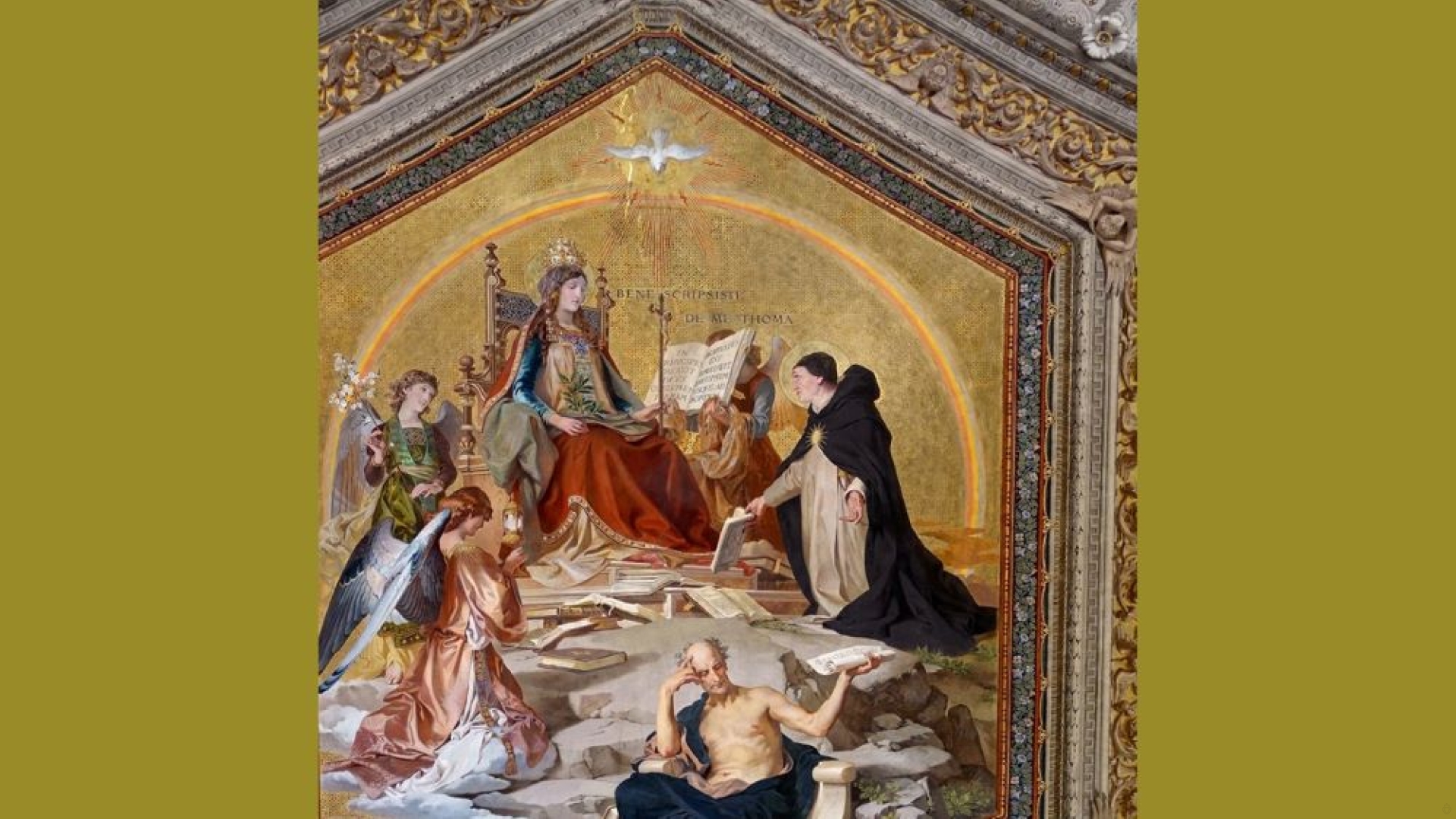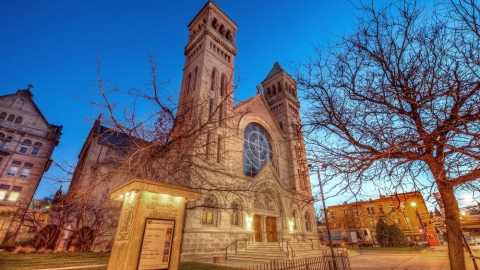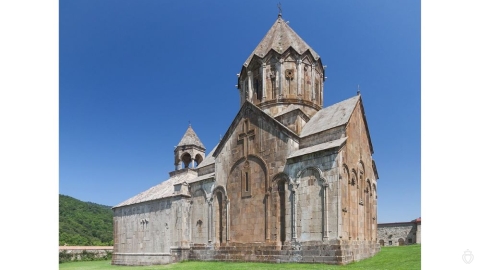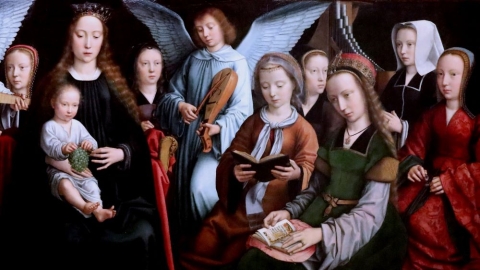Seventh Centenary of the Canonization of St. Thomas Aquinas (2)

“You have written well of me,” the Church said to him. The person in front of the saint is Aristotle.
On the occasion of the 700th anniversary of the canonization of the Angelic Doctor, FSSPX.News is publishing several texts showing the place of the Common Doctor in theology and in the teaching of the Church. The second text is Cum hoc sit by Leo XIII, proclaiming St. Thomas Aquinas patron of Catholic schools.
It is a practice both grounded in nature and approved by the Catholic Church, to seek the patronage of men celebrated by holiness, and the examples of those who have excelled or attained perfection in some way, in order to imitate them.
This is why a large number of Religious Orders, Faculties, Literary Societies, have long wanted to choose, with the approval of the Holy See, as master and patron, St. Thomas Aquinas, who always shone like the sun in doctrine and virtue.
Now, in our times, the study of his doctrine having increased everywhere, many requests have been made for him to be assigned as patron, by the authority of this Apostolic See, to all the worldwide Catholic Colleges, Academies, and Schools.
Several bishops have made it known that this was their wish, and they have sent private or joint letters to this effect; the members of many Academies and Learned Societies have claimed the same favor with humble and earnest entreaties.
It had been thought necessary to postpone satisfying the ardor of these desires and these prayers, so that time might increase their number; but the advisability of this declaration appeared following the publication made last year, on this day, of our Encyclical Letter on the Restoration in Catholic schools of Christian philosophy according to the spirit of the angelic doctor, St. Thomas Aquinas.
In fact, the bishops, the Academies, the deans of the Faculties, and the scholars from all over the world have declared, with one heart and as if with one voice, that they would be docile to our prescriptions; that they even wished, in the teaching of philosophy and theology, to follow entirely in the footsteps of St. Thomas; they affirm, in fact, that they are, like us, convinced that Thomistic doctrine possesses, with eminent superiority, a strength and a singular virtue to cure the evils with which our time is afflicted.
We therefore, who for a long time and earnestly desire to see all the schools flourish under the care and patronage of such an excellent master, given the formal and striking attestation of the universal desire, We judge that the time has come to add this new praise to the immortal glory of Thomas Aquinas.
[Motives for this patronage]
Now, here is the principal and the summary of the motives which influence Us: it is that St. Thomas is the most perfect model that, in the various branches of the sciences, Catholics can propose for themselves.
In him are, in fact, all the lights of the heart and of the mind which rightly impose imitation; a very fruitful, very pure, perfectly ordered doctrine; reverence for faith and admirable accord with divinely revealed truths; the integrity of life and the splendor of the highest virtues.
His doctrine is so vast that it contains, like a sea, all the wisdom that flows from the ancients. All that has been said in truth, all that has been wisely discussed by pagan philosophers, by the Fathers and Doctors of the Church, by the superior men who flourished before him, not only has he fully known, but he increased, completed, classified it with such perspicacity of species, with such perfection of method and such property of terms, that he seems to have left to those who would follow him only the faculty of imitating him, depriving them of the possibility of matching him.
And there is still this of considerable importance: that his doctrine, being formed and as an army of principles of wide application, responds to the necessities, not of an era only, but of all time, and that it is very capable of overcoming ever-recurring errors. Supporting itself by its own strength and valor, it remains invincible and causes its adversaries deep dread.
[Perfect harmony between reason and faith]
We must not less appreciate, especially in the judgment of Christians, the perfect accord of reason and faith.
Indeed, the holy Doctor demonstrates with evidence that the truths of the natural order cannot be in disagreement with the truths that are believed, on the word of God: that, therefore, to follow and practice the Christian faith is not a humiliating and contemptible enslavement of reason, but a noble obedience which sustains the spirit and raises it to greater heights; finally, that reason and faith both come from God, not so that they are in dispute, but so that, united by a bond of friendship, they mutually protect each other.
Now, in all the writings of Blessed Thomas, we see the model of this union and this admirable harmony.
Because one can see there, dominating and shining, sometimes reason which, preceded by faith, reaches the object of its research in the investigation of nature; sometimes faith, which is explained and defended with the aid of reason, in such a way, nevertheless, that each of them preserves its strength and its dignity intact; finally, when the subject demands it, the two march together as allies against the enemies of both.
But, if it were always very important that agreement should exist between reason and faith, or must consider it as much more important since the sixteenth century; for, at that time, the seeds of a freedom beyond all bounds and all rules began to be sown, which has made human reason openly repudiate divine authority and demand from philosophy the weapons to undermine and combat religious truths.
Finally, the Angelic Doctor, since he is great in doctrine, is no less so in virtue and holiness.
Now, virtue is the best preparation for the exercise of the powers of the mind and the acquisition of knowledge; those who neglect it falsely imagine that they have acquired a solid and fruitful wisdom, “For wisdom will not enter into a malicious soul, nor dwell in a body subject to sins” (Wisdom 1:4) .
This preparation of the soul, which comes from virtue, existed in Thomas Aquinas in a degree, not only excellent and eminent, but in such a way that it deserved to be divinely marked by a shining sign.
Indeed, as he had emerged victorious from a very strong temptation towards sensual pleasure, the very chaste adolescent obtained from God, as a reward for his courage, to wear around his loins a mysterious cincture and at the same time to sense the completely extinguished fire of concupiscence. From then on, he lived as if he had been exempt from all bodily contagion, which could be compared to the evangelical spirits, no less for innocence than for genius.
For these reasons, We judge the Angelic Doctor worthy in all respects to be chosen as patron of studies, and, in pronouncing this judgment with joy, We act in the thought that the patronage of this very great and very holy man will be very powerful for the restoration of philosophical and theological studies, to the great advantage of society.
For, as soon as the Catholic schools place themselves under the direction and tutelage of the Angelic Doctor, we will easily see true knowledge flourish, drawn from certain principles and developing in a rational order. Pure doctrines will produce pure morals, be it in private life or in public life, and good morals will result in the salvation of peoples, order, pacification, and general tranquility.
Those who devote themselves to the sacred sciences, so violently attacked in our day, will draw from the works of St. Thomas the means of amply demonstrating the foundations of Christian law, of persuading supernatural truths and of victoriously defending our most holy religion against the criminal assaults from its enemies.
All the human sciences will understand that they will not be prevented or retarded in their progress for this reason; but, on the contrary, stimulated and enlarged; as for reason, it will enter into grace with faith, the causes of dissent having disappeared, and it will take it as a guide in the search for the true.
Finally, all men eager to learn, shaped by the examples and the precepts of such a great master, will get used to disposing themselves well for study by the integrity of morals; and they will not pursue that science which, separated from charity, puffs up minds and misleads them, but that which, deriving “from the Father of lights and from the Master of sciences,” also leads to him.
We were also pleased to ask the opinion of the Sacred Congregation of Rites on the question, and its unanimous opinion is in full accord with Our wishes, by virtue of Our supreme authority, for the glory of Almighty God and the honor of the Angelic Doctor, for the growth of science and the common utility of human society:
We declare St. Thomas, the Angelic Doctor, patron of Catholic Universities, Academies, Faculties, Schools, and, as such, We want him to be held, venerated, and honored by all; it is understood, however, that nothing is changed for the future in the honors and rank given to the saints whom Academies or Faculties may have chosen as particular patrons.
Given at Rome, near St. Peter’s, under the ring of the fisherman, August 4, 1880, of Our pontificate the third year.
(Source : Lettres apostoliques de S. S. Léon XIII, Collection « Les bons Livres »)
Illustration : Flickr / Slices of light (CC BY-NC-ND 2.0)





